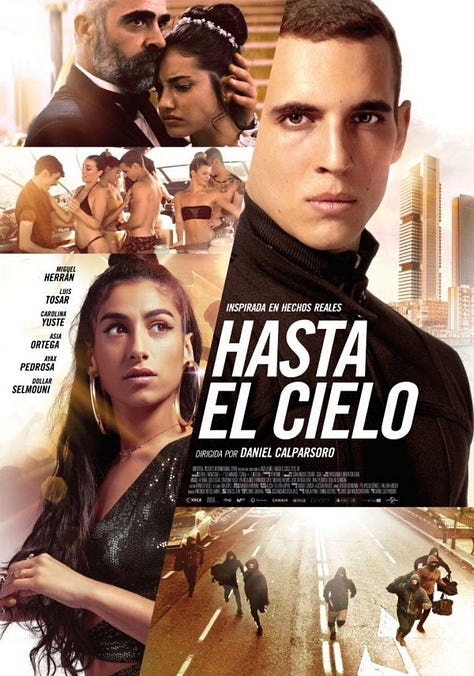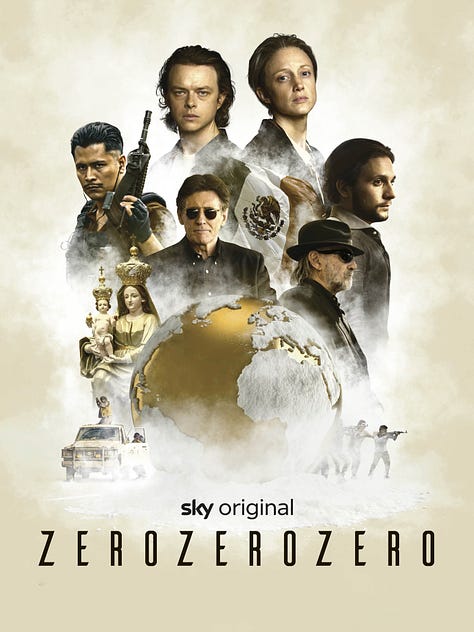For an industry that claims to be progressive and culturally inclusive, the glaring absence of Dominican and Puerto Rican stories on mainstream streaming platforms is a profound contradiction. Turn on any major series that boasts Hispanic representation, and you'll likely find narratives centered on Mexico, Colombia, or Spain—countries and cultures that, while important, dominate the screen far more than the broad spectrum of Latino experiences. Just look at popular shows like Narcos, Zero Zero Zero, Los Farad, or Hasta El Cielo (which, admittedly, is one of my favorite movies and series spin-offs). However, these few countries dominate the portrayal of the Latino experience on screen, leaving out the rich diversity of other Latino cultures and stories that deserve equal recognition.



Where, I ask, are the Dominican and Puerto Rican stories?
These are not niche audiences or underrepresented minorities. Millions of bilingual Latinos in the U.S., particularly those who grew up in households where Spanish was spoken but now primarily communicate in English, go unrecognized by the very industry that should be catering to their dual identity. The Spanglish market, this growing hybrid culture that mixes two languages and two worlds, is ripe for the taking. Yet, no one seems to be tapping into it. And that’s where the real opportunity lies—if, and it’s a big if, anyone in the industry has the courage to move beyond their current models.
The Untapped Spanglish Market
The potential is massive, and I’ve got the perfect show concept for anyone brave enough to read the pitch. But let’s face it, in Hollywood, innovation and risk are rare commodities. Instead, we see executives, agents, and managers making decisions not based on talent or fresh ideas but on recycled formulas and outdated models. The truth is, nobody is targeting the millions of bilingual Latinos who navigate seamlessly between two cultures. This demographic doesn’t want to choose between being Hispanic and being American—they are both. And they are hungry for stories that reflect their complex realities.
The last great Dominican-Puerto Rican project to make waves was Empire, back in 2000, starring the iconic John Leguizamo alongside Delilah Cotto and Peter Sarsgaard. Written and directed by the legendary Franc Reyes, it was a rare cinematic gem that captured the essence of the Puerto Rican experience.
But two decades later, the well has run dry. Hollywood seems content with tokenism and superficial representation. If I could collaborate with anyone to break through this, it would be with cultural titans like Fat Joe, Elis Pacheco, Jennifer Lopez, and of course, John Leguizamo. These figures have the credibility, the platform, and the influence to elevate the conversation and the visibility of Dominican and Puerto Rican narratives in mainstream media in a modern way.
Gatekeepers and the Culture Stalemate
The problem isn’t just about on-screen representation, though—it’s about access. The entertainment industry has become a self-perpetuating machine of gatekeepers, blocking new voices and fresh perspectives from ever seeing the light of day. In this, Hollywood mirrors the dysfunction of American politics: layers of bureaucracy, entrenched interests, and an over-reliance on outdated power structures. Too many people with no creative vision are standing between talent and opportunity, demanding their cut while contributing nothing but barriers. It’s disgusting, frankly.
Look at the decay in creative output. What’s dominating box office sales or filling up the top slots on streaming services? Remakes. Sequels. Prequels.
Safe, predictable content, chosen not for its originality but for its ability to replicate past success. This isn’t just a creative drought—it’s a systemic failure. The industry’s gatekeepers are suffocating creativity, ignoring the pulse of the streets and the cultural currents driving real conversations. There’s a reason why platforms are clogged with content no one asked for.
Take Joker: Folie à Deux. A sequel to a film that, while commercially successful, didn’t demand a follow-up. Yet here we are, pouring $200 million into a project that’s a complete flop. The truth is, for that price tag, you could’ve funded two great series with 10 episodes each, filled with fresh talent and new ideas.
But no. Instead, we get more of the same.
Why? Because too many decision-makers in Hollywood don’t have a clue about what’s really going on in the streets—about what’s really going on in the world outside their bubble.
The big ideas are there—waiting, knocking on the door—but they get ignored in favor of what’s safe, what’s been done before, and what lines someone else’s pockets.
The Next Era: Web3 and the Creator Economy
The question now is, what comes after this stagnant era following the Harvey Weinstein-Diddy generation of exploitation and weirdo shit? What’s next for Hollywood?
I’ll tell you: it’s the rise of Web3 and the creator economy.
Once the creative masses fully understand how to monetize their own content efficiently and effectively, bypass the traditional gatekeepers, and access un-censorable distribution networks, these middlemen will become as obsolete as CD players.
In the same way that blockchain technology is revolutionizing finance, Web3 will flip the entertainment industry on its head.
In this new paradigm, the creators will be in control, not the executives. Artists will have direct access to their audiences, free from the whims of disconnected desk and phone jockeys who have neither the vision nor the ability to recognize the next big thing. Just as blockchain has decentralized financial power, Web3 will decentralize creative power. And the old guard? They’ll be left scrambling, just like the legacy media machine is now, trying to figure out how to stay relevant in a system they no longer control.
But here’s the catch: this revolution won’t come overnight. We need pioneers—people who understand both the creative and technological landscapes—to lead the charge. And we need the industry to stop being so damn scared of real innovation.
The culture is changing. The streets are talking. It’s time Hollywood listens.
Time for Real Change
The truth is, we are long overdue for a reckoning in the entertainment industry. The actors and writers strike of 2023 was just the beginning. The lack of Dominican and Puerto Rican representation on screen is just one symptom of a larger problem—one of stagnation, comfortability, and lack of creativity. The solution is not more remakes, sequels, or out-of-touch big-budget flops. It’s a radical rethinking of how stories are told and who gets to tell them.
We are standing at the precipice of a new era. The Spanglish market is waiting. The creator economy is rising. Decentralization and artificial intelligence are the future. And if Hollywood doesn’t adapt, it will find itself left behind, watching as real creators take control of the narrative.
Let’s make sure we’re the ones shaping that future—on our terms, with our stories.
The question isn’t if this change will come—it’s when. And for those with the foresight and the guts to embrace it, the rewards will be immense.
+AXELGØD





